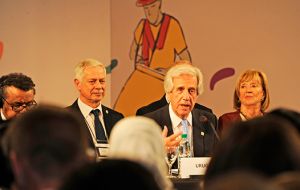MercoPress. South Atlantic News Agency
WHO meeting in Uruguay agree on a Montevideo Roadmap for NCDs
 Uruguay president Dr. Tabaré Vázquez, said the Montevideo Roadmap represented a bold commitment by governments to intensify action to protect people from NCD
Uruguay president Dr. Tabaré Vázquez, said the Montevideo Roadmap represented a bold commitment by governments to intensify action to protect people from NCD Heads of State and Government and ministers from around the world meeting in Uruguay committed to new and bold action to reduce suffering and death from noncommunicable diseases (NCDs), primarily heart and lung diseases, cancers and diabetes, the world’s leading killers.
Governments endorsed the Montevideo Roadmap 2018-2030 on NCDs as a Sustainable Development Priority at the Wednesday opening of the three-day Global Conference on Noncommunicable Diseases in Montevideo, hosted by the World Health Organization and the Presidency of Uruguay.
The pledge follows agreement by world leaders to reduce “premature” deaths from NCDs by one-third by 2030 as part of the United Nations’ Agenda for Sustainable Development. Today, NCDs kill 40 million annually, more than any other cause of death. Of these deaths, 15 million occur prematurely among people aged 30-70 years, and 7 million in low- and low-middle income countries.
“It is shocking to see the growing toll that diseases like cancer and diabetes are taking on the people who can least afford healthcare,” said WHO Director-General Dr Tedros Adhanom Ghebreyesus.
“Governments must act on pledges to prevent these diseases in the first place, and to ensure that people can obtain services to treat them,” he added. “Failure to do this imposes massive costs on individuals and communities. It totally contradicts global commitments to sustainable development.”
Co-conference organizer, President of Uruguay Dr Tabaré Vázquez, said the Montevideo Roadmap represented a bold commitment by governments to intensify action to protect people from the harms of NCDs.
“Governments should be fully committed to reducing the toll from NCDs, as the human and economic costs are far too great to ignore,” said Dr Vázquez. “This places a heavy responsibility on governments to act. But by taking determined action to protect people from the main risks causing NCDs, we will make it easier for people to enjoy healthier lives, while supporting communities and countries to grow and develop strongly.”
The Montevideo Roadmap highlights the need for coordinated and coherent action from all sectors and the whole of society, as many of the main drivers of ill health lie outside the control of health ministries, systems and professionals. Non-State actors, including civil society and industry, have important roles to play.
It also points out that the bulk of NCD deaths could have been prevented by action against tobacco, air pollution, unhealthy diets, physical inactivity, and harmful use of alcohol – as well as by improved disease detection and treatment.
Dr Vázquez added: “Beating NCDs, and promoting health, are issues for everyone and across every area of government. Finance ministries save lives by taxing tobacco, alcohol and sugary drinks, by cutting consumption and raising revenues to treat NCDs. Trade and investment agreements should not be used as an excuse to look the other way, wash our hands and not protect the public health of our citizens. Education ministries need to ensure our youth are well informed and taught how to make the healthy choice, that schools make available healthy food and provide opportunities for play and recreation.”




Top Comments
Disclaimer & comment rulesCommenting for this story is now closed.
If you have a Facebook account, become a fan and comment on our Facebook Page!